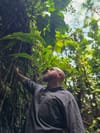Anxiety, Depression, and Ayahuasca: What Research and Practice Reveal
Ayahuasca is being studied as a potential tool for addressing depression and anxiety. Discover what the research says and how therapy can support the process.
The rise in alternative mental health approaches
A growing number of people facing anxiety and depression are seeking alternatives to conventional treatment. Ayahuasca has emerged as a promising tool — when used responsibly and with psychological support.
What research says about Ayahuasca and mental health
Reduction in anxiety and depression symptoms
Studies in Brazil, Europe, and the US suggest that Ayahuasca may significantly reduce symptoms of depression and anxiety when used in structured, supportive environments.
Boosting neuroplasticity
Some evidence indicates that Ayahuasca enhances communication between brain regions, supporting emotional processing and personal transformation.
Clinical practice and the need for care
Despite the growing body of research, Ayahuasca is not a magical cure. Individuals in emotional distress need structure, guidance, and containment. When taken without preparation or support, Ayahuasca can actually intensify suffering.
Therapy provides a safe container to process, integrate, and transform experiences. The psychologist acts as a bridge between inner insights and real-world healing.
Context is everything
Positive outcomes are closely tied to context: who facilitates, where it happens, the intentions involved, and whether proper support is offered. Ayahuasca doesn’t heal alone — it’s the setting and support that unlock its potential.
Conclusion
Ayahuasca can be a powerful ally in addressing anxiety and depression, but it must never replace psychological care. It’s a bridge — not the destination. And therapy is the compass that helps you cross it safely.
Sources and references
- Palhano-Fontes, F. H. et al. (2019). Rapid antidepressant effects of the psychedelic Ayahuasca in treatment-resistant depression: a randomized placebo-controlled trial. Psychological Medicine. https://doi.org/10.1017/S0033291718001356
- Sanches, R. F. et al. (2016). Antidepressant effects of a single dose of Ayahuasca in patients with recurrent depression: a SPECT study. Journal of Clinical Psychopharmacology. https://doi.org/10.1097/JCP.0000000000000184
- de Osório, F. L. et al. (2015). Antidepressant effects of a single dose of Ayahuasca in patients with recurrent depression. Journal of Clinical Psychopharmacology. https://doi.org/10.1097/JCP.0000000000000184
- Uthaug, M. V. et al. (2018). Sub-acute and long-term effects of Ayahuasca on affect and cognitive thinking style and their association with ego dissolution. Journal of Psychopharmacology. https://doi.org/10.1177/0269881117748902
- Labate, B. C. & Cavnar, C. (Eds.). (2014). The Therapeutic Use of Ayahuasca. Springer.

